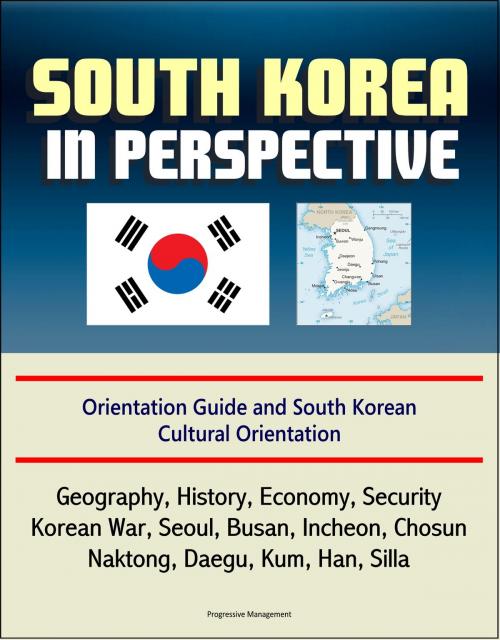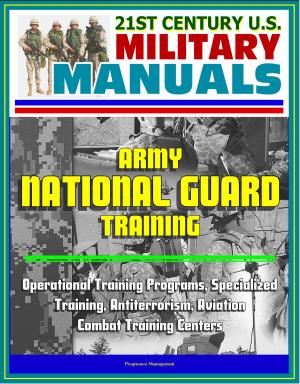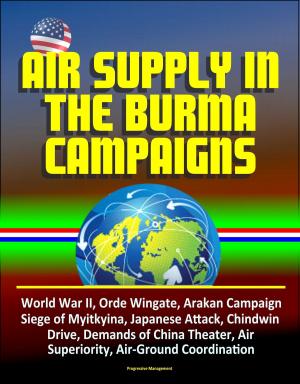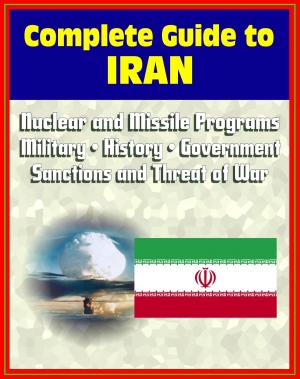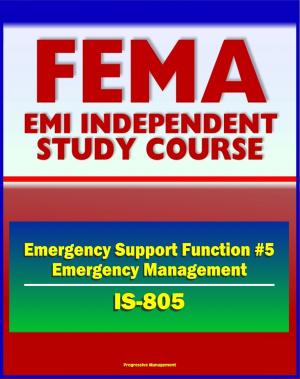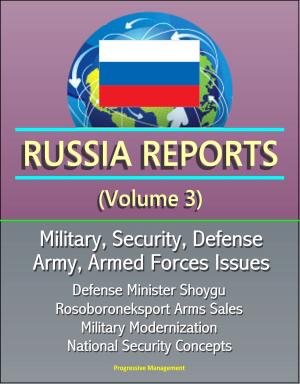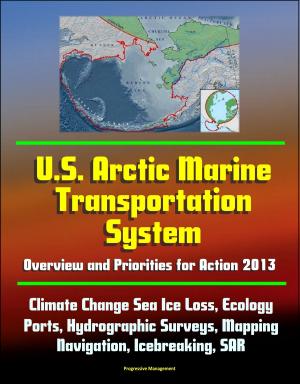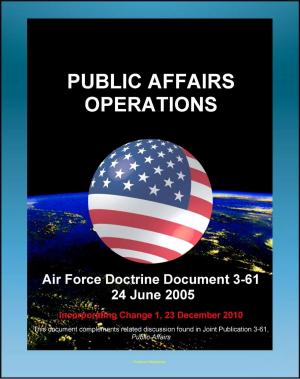South Korea in Perspective: Orientation Guide and South Korean Cultural Orientation: Geography, History, Economy, Security, Korean War, Seoul, Busan, Incheon, Chosun, Naktong, Daegu, Kum, Han, Silla
Nonfiction, History, Asian, Korean War, Military, Asia| Author: | Progressive Management | ISBN: | 9781310346910 |
| Publisher: | Progressive Management | Publication: | September 27, 2015 |
| Imprint: | Smashwords Edition | Language: | English |
| Author: | Progressive Management |
| ISBN: | 9781310346910 |
| Publisher: | Progressive Management |
| Publication: | September 27, 2015 |
| Imprint: | Smashwords Edition |
| Language: | English |
This is a professionally-formatted, free flowing ebook reproduction of unique, up-to-date guides produced by the Department of Defense that provide comprehensive information about all aspects of life in South Korea, with a special emphasis on geography, history, the economy, society, security and military matters, religion, traditions, urban and rural life, ethnic groups, crime, the environment, government, holidays, gender issues and much more.
CHAPTER 1: GEOGRAPHY * Introduction * Geography and Topographic Features * The Central Mountains * The Southern Plain * The Southwestern Plain * Climate * Bodies of Water * East China Sea * Yellow Sea (West Sea) * Sea of Japan (East Sea) * Strait of Korea * The Naktong River * The Han River * The Kum River * Major Cities * Seoul * Busan * Incheon * Daegu * Daejon * Gwangju * Environmental Concerns * Natural Hazards * CHAPTER 1 ASSESSMENT * CHAPTER 2: HISTORY * Introduction * Korean Origins * The Three Kingdoms * The Unified Silla Kingdom (668-935) * The Koryo (918-1392) * The Chosun Dynasty (1392-1910) * Japanese Colonialism (1910-1945) * A Divided Nation (1945-1949) * The Korean War * The Aftermath of War * On the Road to Democracy (1961-1987) * Modern Korea (1987-2012) * Recent Events * CHAPTER 2 ASSESSMENT * CHAPTER 3: ECONOMY * Introduction * Agriculture * Fishing * Manufacturing/Industry * Energy * Natural Resources * Trade * Tourism * Banking and Finance * Standard of Living * Employment Trends * Outlook * CHAPTER 3 ASSESSMENT * CHAPTER 4: SOCIETY * Introduction * Ethnic Groups and Languages * Religion * Shamanism * Buddhism * Christianity * Cuisine * Traditional Dress * Gender Issues * Arts * Pottery * Painting * Literature * Dance * Music * Folklore * Sports and Recreation * Taekwondo * Sheeruhm * Soccer * Baseball * Archery * Traditional Games * CHAPTER 4 ASSESSMENT * CHAPTER 5: SECURITY * Introduction * Relations with the United States * Relations with Neighbors * North Korea * China * Japan * Russia * Police * Military * Issues Affecting Stability * North Korea * Energy * Political Violence * Demographics * CHAPTER 1: PROFILE * Introduction * Geography * Climate * Bodies of Water * Major Cities * Seoul * Busan * Incheon * Daegu * Daejon * Gwangju * History * The Three Kingdoms (108 B.C.E.-918) * The Koryo (918-1392) * The Chosun Dynasty (1392-1910) * Japanese Occupation and the Korean War (1910-1953) * On the Road to Democracy (1953-1987) * Modern Korea (1987-2012) * Government * Media * Economy * Ethnic Groups and Languages * Chapter 1 Assessment * CHAPTER 2: RELIGION * Overview * Major Religions * Shamanism * Buddhism * Christianity * Religion and Government * Influence of Religion in Daily Life * Religious Holidays * Buildings of Worship * Churches and Cathedrals * Temples * Behavior in Buildings of Worship * Churches * Temples * Chapter 2 Assessment * CHAPTER 3: TRADITIONS * Introduction * Formulaic Codes of Politeness * Male/Female Interaction * Hospitality and Gift Giving * Eating Habits * Eating Out * Drinking Culture and Rituals * Dress Codes * Nonreligious Holidays * New Year's Day * Seollal (Lunar New Year) * Gookgyongil (Independence Day or National Day) * Labor Day * Uhleenee nal (Children's Day) * Ahbahee nal (Parents' Day) * Hyunchoonil (Memorial Day) * Gwangbokjol (Liberation Day) * Chuseok (Harvest Moon Festival) * Gaechunjul (National Foundation Day) * Hangul nal (Hangul Proclamation Day) * Dos and Don'ts * Chapter 3 Assessment * CHAPTER 4: URBAN LIFE * Introduction * Work Problems in Urban Areas * Urban Healthcare * Education * Restaurants * Marketplace and Street Vendors * Transportation * Cars and Motorcycles * Taxis * Subways * Buses * Trains * Ferries and Airplanes * Urban Crime * Chapter 4 Assessment * CHAPTER 5: RURAL LIFE * Introduction * Land Distribution and Rural Development * Economy * Transportation * Rural Healthcare * Education * Who's in Charge? * Border Crossings and Checkpoints * Landmines
This is a professionally-formatted, free flowing ebook reproduction of unique, up-to-date guides produced by the Department of Defense that provide comprehensive information about all aspects of life in South Korea, with a special emphasis on geography, history, the economy, society, security and military matters, religion, traditions, urban and rural life, ethnic groups, crime, the environment, government, holidays, gender issues and much more.
CHAPTER 1: GEOGRAPHY * Introduction * Geography and Topographic Features * The Central Mountains * The Southern Plain * The Southwestern Plain * Climate * Bodies of Water * East China Sea * Yellow Sea (West Sea) * Sea of Japan (East Sea) * Strait of Korea * The Naktong River * The Han River * The Kum River * Major Cities * Seoul * Busan * Incheon * Daegu * Daejon * Gwangju * Environmental Concerns * Natural Hazards * CHAPTER 1 ASSESSMENT * CHAPTER 2: HISTORY * Introduction * Korean Origins * The Three Kingdoms * The Unified Silla Kingdom (668-935) * The Koryo (918-1392) * The Chosun Dynasty (1392-1910) * Japanese Colonialism (1910-1945) * A Divided Nation (1945-1949) * The Korean War * The Aftermath of War * On the Road to Democracy (1961-1987) * Modern Korea (1987-2012) * Recent Events * CHAPTER 2 ASSESSMENT * CHAPTER 3: ECONOMY * Introduction * Agriculture * Fishing * Manufacturing/Industry * Energy * Natural Resources * Trade * Tourism * Banking and Finance * Standard of Living * Employment Trends * Outlook * CHAPTER 3 ASSESSMENT * CHAPTER 4: SOCIETY * Introduction * Ethnic Groups and Languages * Religion * Shamanism * Buddhism * Christianity * Cuisine * Traditional Dress * Gender Issues * Arts * Pottery * Painting * Literature * Dance * Music * Folklore * Sports and Recreation * Taekwondo * Sheeruhm * Soccer * Baseball * Archery * Traditional Games * CHAPTER 4 ASSESSMENT * CHAPTER 5: SECURITY * Introduction * Relations with the United States * Relations with Neighbors * North Korea * China * Japan * Russia * Police * Military * Issues Affecting Stability * North Korea * Energy * Political Violence * Demographics * CHAPTER 1: PROFILE * Introduction * Geography * Climate * Bodies of Water * Major Cities * Seoul * Busan * Incheon * Daegu * Daejon * Gwangju * History * The Three Kingdoms (108 B.C.E.-918) * The Koryo (918-1392) * The Chosun Dynasty (1392-1910) * Japanese Occupation and the Korean War (1910-1953) * On the Road to Democracy (1953-1987) * Modern Korea (1987-2012) * Government * Media * Economy * Ethnic Groups and Languages * Chapter 1 Assessment * CHAPTER 2: RELIGION * Overview * Major Religions * Shamanism * Buddhism * Christianity * Religion and Government * Influence of Religion in Daily Life * Religious Holidays * Buildings of Worship * Churches and Cathedrals * Temples * Behavior in Buildings of Worship * Churches * Temples * Chapter 2 Assessment * CHAPTER 3: TRADITIONS * Introduction * Formulaic Codes of Politeness * Male/Female Interaction * Hospitality and Gift Giving * Eating Habits * Eating Out * Drinking Culture and Rituals * Dress Codes * Nonreligious Holidays * New Year's Day * Seollal (Lunar New Year) * Gookgyongil (Independence Day or National Day) * Labor Day * Uhleenee nal (Children's Day) * Ahbahee nal (Parents' Day) * Hyunchoonil (Memorial Day) * Gwangbokjol (Liberation Day) * Chuseok (Harvest Moon Festival) * Gaechunjul (National Foundation Day) * Hangul nal (Hangul Proclamation Day) * Dos and Don'ts * Chapter 3 Assessment * CHAPTER 4: URBAN LIFE * Introduction * Work Problems in Urban Areas * Urban Healthcare * Education * Restaurants * Marketplace and Street Vendors * Transportation * Cars and Motorcycles * Taxis * Subways * Buses * Trains * Ferries and Airplanes * Urban Crime * Chapter 4 Assessment * CHAPTER 5: RURAL LIFE * Introduction * Land Distribution and Rural Development * Economy * Transportation * Rural Healthcare * Education * Who's in Charge? * Border Crossings and Checkpoints * Landmines
